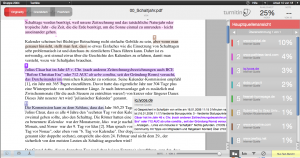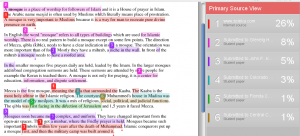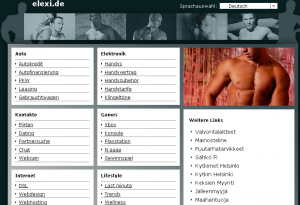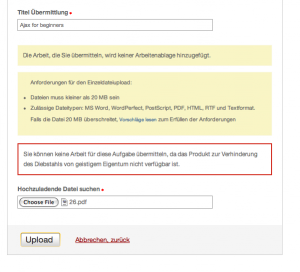Software Profile | Testoverview | Summary| Screenshots | Business Promotion | Links
Software Profile
| ID | S10-01 |
| Product | Turnitin |
| Company | iParadigms, LLC, 1111 Broadway, 3rd floor, Oakland, CA 94607, USA Europäische Reseller: iParadigms Europe Ltd., 6-8 Charlotte Square, Newcastle, NE1 4XF, UK |
| Web Site | http://www.turnitin.com |
| Software Type | Online, can be integrated into Blackboard and Moodle |
| Costs | There are different license models, Campus License, Department License. The costs depend on the number of students. For more information the company has to be contacted. |
| Test Date | 2010-09-13 |
Testoverview
| Ranking for all tests: | 3 |
| Ranking for tests 10-40: | 3 |
| Ranking for tests 31-40: | 5 |
| Usability: | 5 |
| Professionalism | 4 |
| Middle Ranking | 4 |
| Effectiveness (Grade): | 3,3 |
| Overall Ranking: | 2
partially useful |
Summary
Coming in second is the well-known US system Turnitin, sold by the company iParadigms. The system has been plagued with problems in the past including inability to deal with umlauts, ignoring the Wikipedia, and having a relatively complex setup. They have managed to partially sort out many of these problems, now doing better on German texts than on English ones, getting the best results for material that they already have stored in their databases. This is a problem from a European standpoint, as it is not legal to store copies of material without the express permission of the copyright owners. Also, many theses in technical fields contain material which is under a non-disclosure agreement and must not in any way be stored in databases.
We analyzed why Turnitin has moved up from overall effectiveness place 13 in the 2008 test to place 3 in this test – the reason is that the other systems have gotten worse. Test cases such as number 18 (a highly-edited version of a paper available online) is now consistently not found by many systems, as well as a plagiarism from a blog (number 29). For the test cases that include plagiarism from multiple sources, many of the software systems were not able to find all of the sources, causing them to lose points on effectiveness.
Turnitin now has a German-language version that still has a few kinks in it, translation-wise (Benotungsbuch for gradebook, for example). There are still problems with Turnitin flagging spam sites that have scraped the content of the Wikipedia. Some of these sites are not safe for work, as their business market is selling pornography. This might cause a problem when used on school computers. Interestingly enough, the Wikipedia itself was often listed just after these sites. There was also a problem with the database flagging plagiarism from pages that no longer exist. Often this was, indeed, the correct page, but for a teacher it is frustrating to find evidence of plagiarism, but not to be able to find the source, which would be necessary for sanctioning the student.
Company Statement
1) “Plagiarism Detectors”
As you know, we fully agree that the historic categorization of these tools as “plagiarism detectors” is a misnomer and that the “magic bullet, a software that can quickly and effortlessly determine which papers are plagiarisms” (Köhler & Weber-Wulff 2011) is, we agree, a false goal.
Plagiarism detection is not something that can be automated by technology alone. It will always require academic judgement and must be addressed using a holistic approach that uses both technology and pedagogy. We believe that our system operates as a catalyst to help students improve research and writing practice by identifying ‘unoriginal content’ and providing rich feedback through online grading.
2) Turnitin Follows EU copyright and data privacy laws
Your reports states that Turnitin faces “a problem from a European standpoint, as it is not legal to store copies of material without the express permission of the copyright owners. Also, many theses in technical fields contain material which is under a non-disclosure agreement and must not in any way be stored in databases.” (Köhler & Weber-Wulff 2011)
This is not true.
Turnitin administrators and instructors have complete control over whether or not documents submitted to the database are stored or not. The system fully complies with European law, has always allowed academics to choose not to store students work and since the 2008 test allows students to opt-out of having their work stored from the Turnitin interface if the institution has this feature turned on. Institutions have the right to have their work deleted at any time. No system you have tested is as compliant or provides the same level of sophistication in terms of data protection or storage options.
Note: some institutions require their students to allow work to be maintained by the institution (not iParadigms) for the maintenance of academic standards and the student database facility in Turnitin provides for this requirement.
Screenshots

Screenshot 1: An original essay has been reported as 25% plagiarism – because of a correct quoted table and other sites that have been copied us.

Screenshot 2: A lot of little matches can’t be found, if the sensibility has not been raised.

Screenshot 3: A lot of spam-sites are reported. Not all sufficient to use at work. This is one of the harmless examples.
Screenshot 4: What? The translation is not always easy to understand.
Business Promotion
„Our award-winning solution discourages plagiarism and facilitates rich, meaningful feedback that improves writing skills, promotes critical thinking, and streamlines grading.“
Links
official website http://www.turnitin.com

